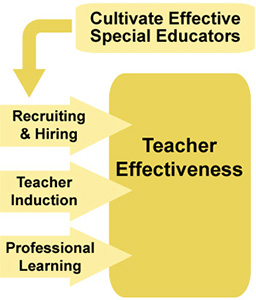What can school leaders do to reduce the number of special education teachers who leave each year?
Page 3: Recruiting and Hiring
 Though some states provide significant help in recruiting teachers, others offer fewer supports. Whatever the case, thoughtful recruitment and hiring practices will help school leaders hire and retain highly effective special education teachers. Taking steps to hire the best possible applicants can have important payoffs.
Though some states provide significant help in recruiting teachers, others offer fewer supports. Whatever the case, thoughtful recruitment and hiring practices will help school leaders hire and retain highly effective special education teachers. Taking steps to hire the best possible applicants can have important payoffs.
- Teachers who have received extensive preparation are more likely to use effective practices and to stay in their positions than are those who have minimal preparation.
- Teachers who are assigned to jobs that match their training, experience, and preferences are more likely to stay.
For these reasons, it is important that school leaders take a proactive approach to recruiting and hiring the most effective teachers they can find. They can be proactive by using the recruitment and hiring ideas described below.
Recruitment
One way to keep special education teachers is to hire effective teachers to begin with. Early recruitment and hiring gives leaders an edge in finding highly qualified special educators. Those who delay until late summer risk missing out on the strongest applicants. Unfortunately, to some school leaders, early recruitment and hiring might seem impossible until the state or district budget is approved. However, even though a school administrator may not think he or she can start recruiting until a final budget has been approved, he or she can put out feelers or collect preliminary information about potential recruits so that he or she is ready to offer the position to a strong recruit when the position does become final.
School administrators can attract strong special education candidates by getting the word out about job openings, rather than waiting for potential applicants to find them. They can recruit teachers by:
- Contacting local colleges and universities
- Advertising in local newspapers, radio, and television (many large districts advertise in national publications)
- Attending job fairs
- Hiring external recruiters
- Utilizing teacher websites (e.g., the Council for Exceptional Children)
- Using technology (e.g., social media sites, virtual job fairs, electronic bulletin boards)
New special education graduates are not the only source of effective teachers. Each year, many former special educators are recruited from a reserve pool (e.g., early retirees, those who elected to stay home with children) and choose to return to the workforce.
Providing incentives is a widely used strategy for recruitment. In general, higher-paying districts are more likely to attract teachers than are those with lower pay. In particular, teacher salary and benefits must be competitive with surrounding areas, although compensation is not the only factor. Teachers weigh compensation along with other considerations, such as working conditions and distance from home. Additional incentives might include:
- Opportunities for induction and professional learning
- Financial support for relevant coursework or degrees
- Signing bonuses
- Salary advances
- Moving expenses
- Autonomy in scheduling (i.e., allowing teachers to set their own schedules)
- Faculty leadership role (e.g., team leader)
- Assistance with buying homes through low down-payments or home-buying assistance
- Bonuses for teaching in high-demand areas
Districts may want to partner with others (e.g., states, teacher education programs at local colleges or universities) to develop alternative teacher preparation programs designed to meet local needs. Such programs often recruit individuals who already live in the community and have experience with students with disabilities (e.g., paraprofessionals). These local individuals may be in a better position not only to stay but also to understand the needs of the community, schools, and students.
Hiring
In centralized hiring practices, central office personnel are often responsible for the major hiring tasks. In a decentralized process, school leaders hire teachers, often after an initial screening at the district level. In that process, candidates and the school staff have opportunities to interact, providing both the school staff and the teacher candidate with more knowledge about each other.
Leaders need to look beyond the teacher credentials and instead assess the strength of the applicant’s preparation for teaching. Key questions are:
- Is the candidate’s program accredited?
- What courses are on the applicant’s transcript and how extensive was his or her field experiences?
- Has the candidate completed the required tests or assessments?
- Do the references include those who have observed the candidate teach?
Thoughtful questions used across applicant interviews help focus the interview process. Key questions might address:
- Understanding of students with disabilities
- Experience working with diverse groups and families
- Inclusion, collaboration, and co-teaching
- Instructional strategies
- Individualized education programs (IEPs)
- Experience managing student behavior
- Assistive technology
Lee Kirkpatrick, a former elementary school principal, shares some suggestions for recruiting new special education teachers (time: 0:57).
Lee Kirkpatrick
Student Support Services Supervisor, Franklin Special School District
Former Elementary Principal
Franklin, Tennessee

Transcript: Lee Kirkpatrick
I think it is critical to start early so that the pool of candidates that you are recruiting is at its largest. A team approach is a must. You need to include therapists on that interview team. You need to include other special education teachers, general education teachers, maybe even somebody from the district level. It brings different perspectives to that team. I also think it is very important in the interviews to be extremely honest with the candidate. Try to describe the job at its best and at its worst so that a candidate coming in they’re prepared. They’ve left that interview, and they say, “Wow, they didn’t just try to paint a rosy picture for me. They were very realistic about what these expectations were going to be.”
Mars Hill Middle School
Clara Kamei reviews her recruiting and hiring procedures, in keeping with A Leader’s Model. Following her review, she still believes she has strong recruiting and hiring procedures in place, but she does identify a few areas where she can make some minor changes.